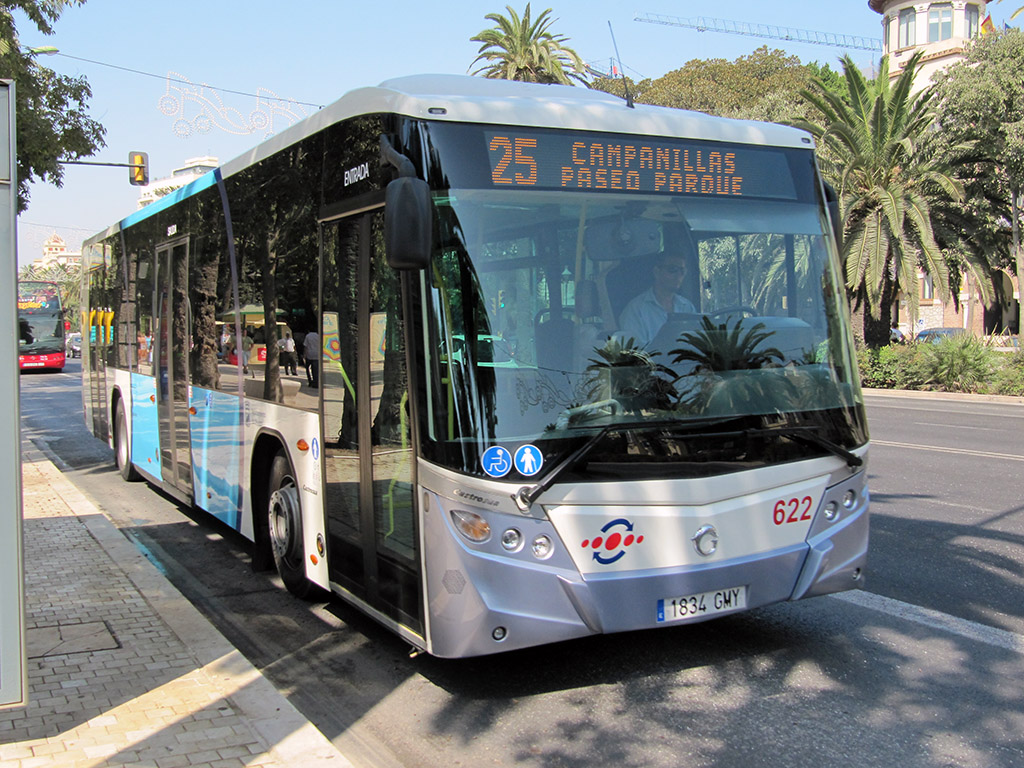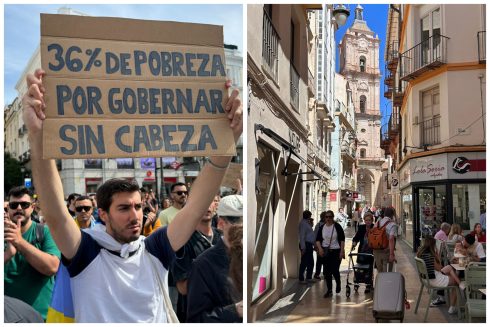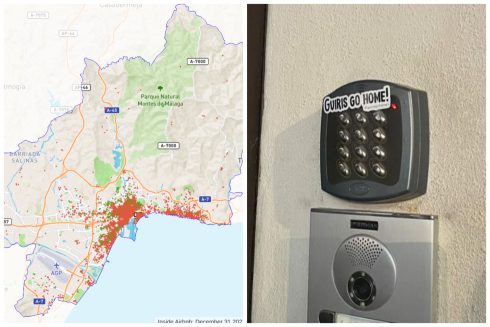OVER half a million people live along the Costa del Sol, not counting Malaga city, a number that is said to triple during the summer.
It is one of Spain’s busiest tourist hotspots, receiving 1.5 million visitors each year and generating over a third of Andalucia’s tourism revenue.
Marbella property is among the most sought after in Europe, and every resort along the coast is seeing growth – some explosively so.
And yet, if you look at a train map for Spain, you will notice that, for such an important economic hub, the sun coast is a curious black spot.
Tourists and new residents are usually shocked to discover that the coastal train from Malaga and its airport stops after just 25km at Fuengirola.
The only way to get further is in a vehicle.
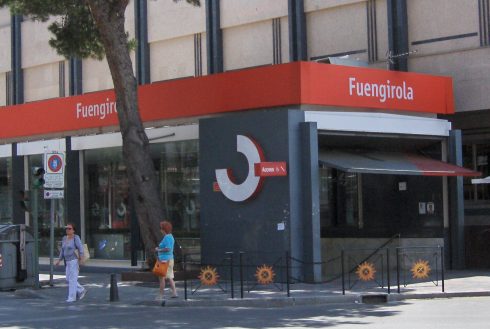
And, for the overwhelming majority of people, the only reliable way to get around is by car.
Those without a car (or a driving licence) are largely left with a Herculean task of getting around, that is if they travel between resorts or, indeed, regularly to the airport.
Deprived of basic, reliable mobility, tens of thousands of people find themselves in the dehumanising position of being unable to carry out basic functions, such as getting to work, doing the shopping or visiting friends.
And we are not making this up. Read our sidebar on a test set for a junior reporter.
Age-old demand
It’s also a plain fact that every mayor on the coast has long been begging for the train line to be extended, at least to Estepona, but why not all the way to Algeciras?
Marbella mayor Angeles Muñoz stressed the ‘profitability’ of such an endeavour, while Fuengirola leader Ana Mula hailed the idea as ‘transcendental’ and said it would ‘benefit the environment’.
Torremolinos town hall meanwhile described it as ‘a key project to improve mobility in an area with one of the highest private traffic saturation rates’.
A spokesman pointed out the proposed extension would ‘considerably reduce the movement of vehicles, facilitating mobility and connection.’
Expat councillor Scott Marshall, in Benahavis, told the Olive Press: “It’s about time something was done and we moved forwards with better buses, at least.”
This proposal has been chewed over by successive local administrations for decades – generations even.
And yet here we still are, without a coastal line like the one running from the French border and the Costa Brava all the way down through to the Costa Blanca and Alicante.
Demand
Residents are not completely without public transport options, of course: bus company Avanza has a service running all the way from Malaga to La Linea.
The problem is that most of the available options are practically useless. Our readers have told us so. And in no uncertain terms.
An online poll conducted by the Olive Press found that a huge majority (87%) declared public transport to be ‘a problem’.
“For somebody that doesn’t have a car, living in this area is a true nightmare,” Louisa Nunn, 62, an Estepona-based expat, explained.
“There are just not enough buses. And because there’s no train service, there’s no alternative,” she continued.
“So if you want to get into Malaga or Marbella, or somewhere like La Cañada shopping centre, you have to get a taxi. And not everybody is wealthy enough to afford that.”
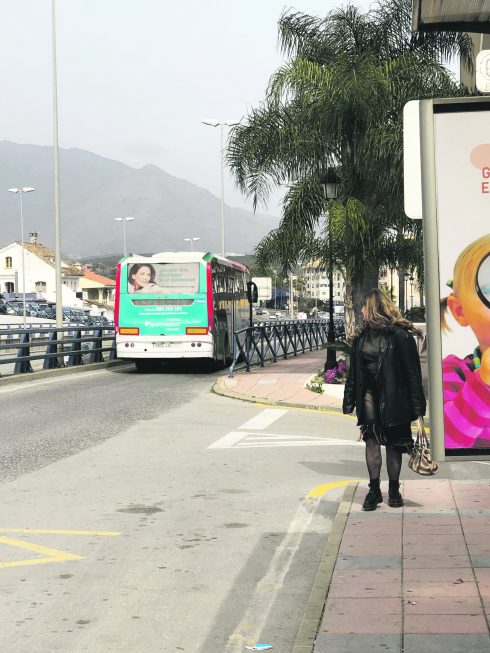
The gripes are many. They include buses that run late to those that depart early, services that only run a few times a day, and route changes that aren’t announced.
Real-time information on routes and schedules is available on Google Maps and other apps in cities such as Malaga or Marbella, but outside the metropolitan areas transport agencies have been slow to share their data with the tech companies – meaning you never know when a bus is coming.
So, for most people, the only way to get to grips with regional transport is to spend several days figuring out when buses arrive, where they go and what route they follow. By the time you’ve worked it out your holiday may be over… or you may be out of a job!
It is certainly not something to undertake when you have an important appointment in a neighbouring town, a flight to catch, or just an irritable disposition.
Estepona-based retired nurse Michael Lendrum, 56, doesn’t own a car, but says he’d rather borrow one from a friend than rely on public transport.
“A bus can come 30 minutes either side of the scheduled time,” he observed. “And you can’t take a flight at Malaga airport before 10am as the first bus won’t get you there before 8.30am.”
Equally bad, tourists frequently arrive on late flights only to find they’ve missed the last bus – and without a car that’s a big problem.
“When my mother jumped in a taxi from the airport to my house, it cost her €140,” revealed Lendrum.
This very reporter had to stay a night in Malaga on arrival at 10pm, with very little options, apart from a costly taxi.
Ana, a school teacher at the British School of Marbella, expecting her first child in April, has learnt the hard way the necessity of having a car: “Public transport in the south of Spain doesn’t work properly.”
She adds: “I live in San Pedro and there is no other way to get to work. I have friends at work who don’t drive and they struggle to get there on time. They have to ask for a lift from colleagues, or get an Uber.”
Carmen, who works at the same school, told the Olive Press that with so many cars on the road ‘it can get a bit dangerous’.
“The traffic is heavy and it’s fast. I’ve known people who had accidents, so the roads don’t feel safe.”
The failure to provide an adequate bus service has made the coastal roads west from Malaga to Sotogrande, some of the most heavily used in Europe.
There are 950,000 registered drivers in Malaga province, and the congested A7 around Marbella is notorious for accidents. In 2022, 32 traffic fatalities were reported in the province, and 31 in 2021.
While the Diputacion de Malaga is promoting measures to reduce our individual carbon footprints and the Junta promotes green policies, the efforts are undermined when more cars are forced onto the road.
The most scathing indictment of the state of public transport along the coast is that it is even unclear which public body is responsible for the mess.
The Diputacion passed the buck to Malaga Town Hall who told the Olive Press it was the responsibility of the Transport Consortium of Malaga.
The director general of the Metropolitan Transport Consortium of Malaga, Francisco Javier Berlanga Fernández – with jurisdiction only up until Mijas – agreed with the Olive Press ‘that there is much to do.’
But he still seemed oblivious to the scale of the problem, denying that ‘anyone is left abandoned’.
“Perhaps users are unaware that on these routes the exact arrival time of the bus can be known through their phone,” he said, contrary to the experiences of everyone the Olive Press spoke to for this article.
But Berlanga Fernández did concur with one point the Olive Press put to him.
“You are absolutely right – the trainline extension throughout the rest of the West Coast is not something we will see for quite a while.”
Don’t hold your breath
While the coast’s main bus operator Avanza confirmed if it was clear the demand was higher, it would put on more buses.
We sent them our survey results and they claimed to have taken them on board.
They told us they measure demand daily by ‘registering ticket cancellations in our machine’.
This is surely an inadequate method to understand the true reality of how many people would use the bus service if it was fit for purpose.
Some might say it’s a chicken and egg scenario, others might quote Kevin Costner in a Field of Dreams – ‘if you build it, they will come’.
This seems to be the case for Nadia McDonald, and the dozens of other expats and Spaniards we have spoken to.
With municipal elections looming in May, it is the perfect time to raise the issue of public transport with your local town halls.
It’s time for politicians to get moving with a safe and sustainable mobility plan.
READ MORE:‘
- WATCH: Raging inferno guts the La Bajadilla Marina in Marbella and dozens of pleasure boats and jet skis within
- TRAVEL: A wild 36 hours in Morocco – via the disaster of public transport
- Disgusting, frustrating, nightmare, shambles:’ Residents in Spain’s Costa del Sol vent their feelings at the region’s public transport

